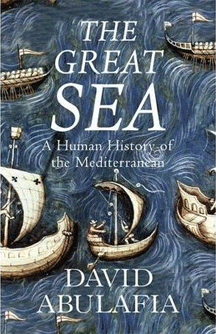By Fred H. Lawson
Existing histories of the Mediterranean Sea adopt a perspective that is either too narrow, focusing exlusively on one corner or another of the vast basin that unites southern Europe, southwest Asia and northern Africa, or too broad, incorporating areas that lie far from the coast. David Abulafia sets out to replace such studies with a survey of Mediterranean history from 22000 BC to the present that highlights connections among littoral communities and accords equal weight to actors on all shores. This ambitious project gets off to an admirable start, as developments in Neolithic and Bronze Age Malta, Crete, Anatolia and Syria receive thoughtful attention. Pharonic Egypt is excluded on the grounds that it looked inward rather than outward; the Hebrews get included, despite the fact that they interacted exclusively with inland powers. Readers intrigued by Abulafia’s analysis of the conflict between the Greeks and Troy can find a more extensive presentation of the argument in Michael Wood’s 1985 television documentary “In Search of the Trojan War.”
Before long, however, the text reverts to a rather conventional narrative of the Phoenicians and their far-flung trading posts, rivalries among the Greek city-states (albeit with insightful remarks about links to Ischia on the western side of the Italian peninsula), the Etruscans, the rise of Alexandria, the consolidation and disintegration of the Roman Empire and so on. The absence of the southern shore of the Mediterranean becomes increasingly palpable, as does the neglect of the Iberian peninsula and southern France as sources of agency, rather than just sites of Phoenician, Greek or Roman imperialism.
When major actors do arrive from the southeast, they make a poor showing. “Typically,” Abulafia remarks, ‘Amr ibn al-‘As, the general who led the Muslim conquest of Egypt, “was already at odds with his master the caliph.” Things had not improved much a century afterwards: “Often, though, the Muslim navies [around 800] were more intent on grabbing booty (including captives, whom they would put on sale), than in trying to extend the dominion of Islam.” When the ruler of eastern Spain attacks Sardinia in 1013, the focus remains fixed on the reactions of Pisa and Genoa; no effort is made to explain whatever impetus may have driven “the Spanish Muslim warlord Mujahid.” Similarly, “from 1062 to 1108 Mahdia [in present-day Tunisia] was ruled by a single vigorous emir, Tamin, who enriched himself not just from trade but from pirate attacks on Nicotera in Calabria and Mazara in Sicily.” Two hundred years later, the Turkish emirates of western Anatolia “spent as much time quarrelling among themselves as they spent raiding Christian lands.” Revisionist studies of “Arab piracy” in the Persian Gulf appear not to have influenced Mediterranean historians.
Tantalizing intimations that communities outside Europe played a crucial role in shaping Mediterranean history can be found scattered throughout the book. Trade with Muslim Majorca evidently had an impact on eleventh-century Pisa; the rise of the Karimi merchants of North Africa rearranged commercial relations across the region; during the 1160s, “the trade of Sicily was being turned around, so that the traditionally close ties to North Africa were replaced by close links to northern Italy;” major transformations shook Spain and North Africa throughout the early thirteenth century; Majorcan merchant-princes “battled, literally, with the rulers of the facing shores─Marinid Berbers in Morocco, the Nasrid rulers of Granada in southern Spain.” But like Rosencrantz and Guildenstern, these subsidiary players emerge from the shadows, utter a line or two, and quickly withdraw. In a 648-page tome, more serious consideration could surely have been given to long-neglected protagonists.
Fred H. Lawson (ΦBK, Indiana University, 1973) is the Lynn T. White, Jr. Professor of Government at Mills College and a resident member of the Zeta of California chapter of Phi Beta Kappa.




